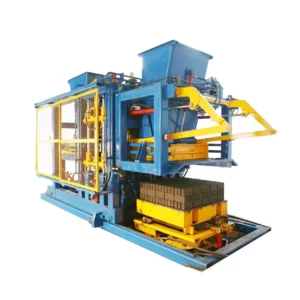What are the advantages of using fully automatic block making machines compared to manual or semi-automatic ones?
Fully automatic block making machines offer several advantages over manual or semi-automatic machines.
Here are some key benefits of using fully automatic block making machines:
Increased Production Efficiency: Fully automatic machines automate the entire block production process, resulting in significantly higher production efficiency compared to manual or semi-automatic machines. They can produce blocks at a faster rate, allowing for greater output in a given time frame. This increased production efficiency can be particularly beneficial for large-scale construction projects or businesses with high production demands.
Labor Savings: Fully automatic machines require less manual labor compared to manual or semi-automatic machines. Once the machine is set up and running, it can perform most of the production processes automatically, reducing the need for manual intervention. This can lead to significant labor savings and allows workers to focus on other tasks, such as quality control or maintenance.
Consistent Block Quality: Fully automatic machines are designed to maintain consistent block quality throughout the production process. They ensure precise material compression, accurate mold filling, and consistent block dimensions, resulting in uniform blocks with reliable strength and durability. This is especially important for construction projects where consistent block quality is crucial for structural integrity.
Advanced Control Systems: Fully automatic block making machines often come equipped with advanced control systems and programmable logic controllers (PLCs). These systems allow for precise control and adjustment of various parameters, such as block size, block making machines suppliers material composition, and production speed. They also provide real-time monitoring and diagnostics, enabling prompt identification and resolution of any issues that may arise during production.
Reduced Human Error: By automating most of the production processes, fully automatic machines minimize the risk of human error. Manual or semi-automatic operations are more prone to inconsistencies, variations in block quality, and potential mistakes in material proportioning or compression. The automated nature of fully automatic machines leads to greater accuracy and consistency in block production.
Operator Safety: Fully automatic machines often incorporate safety features and guards to protect operators from potential hazards associated with manual handling and operation. They minimize direct operator involvement in potentially dangerous tasks, reducing the risk of injuries and accidents.
It’s worth noting that fully automatic block making machines generally have higher upfront costs compared to manual or semi-automatic machines. Additionally, they may require more advanced technical knowledge and maintenance expertise. Therefore, the choice between manual, semi-automatic, and fully automatic machines depends on the specific production requirements, budget, and resources available.
What are some common maintenance tasks or issues that may arise when using fully automatic block making machines?
When using fully automatic block making machines, it’s important to perform regular maintenance to ensure optimal performance and address any potential issues promptly.
Here are some common maintenance tasks and issues that may arise:
Cleaning and Lubrication: Regular cleaning of the machine, including the molds, conveyor belts, and other components, is essential to prevent material buildup and maintain smooth operation. Additionally, lubricating moving parts as per the manufacturer’s recommendations helps reduce friction and prevent premature wear.
Inspection and Replacement of Wear Parts: Certain components of the machine, such as molds, compression plates, and conveyor belts, may experience wear over time due to the abrasive nature of the materials used. Regular inspection and timely replacement of these wear parts are necessary to ensure consistent block quality and prevent machine breakdowns.
Electrical and Mechanical System Maintenance: Fully automatic machines have electrical and mechanical systems that require regular inspection and maintenance. This includes checking electrical connections, sensors, motors, and other mechanical components to ensure they are functioning properly. Any signs of wear, damage, or malfunction should be addressed promptly by qualified technicians.
Calibration and Adjustment: Over time, certain machine parameters may require calibration or adjustment to maintain accurate and consistent block dimensions and quality. This may involve adjusting the compression force, vibration frequency, or material feeding mechanisms. Regular calibration helps optimize the machine’s performance and ensures the desired block characteristics.
Control System Maintenance: The control system, including programmable logic controllers (PLCs) and human-machine interfaces (HMIs), should be regularly maintained and updated as needed. This involves checking for software updates, monitoring system performance, and addressing any operational issues or error messages displayed on the control panel.
Troubleshooting and Repairs: Despite regular maintenance, issues may still arise with fully automatic block making machines. These could include problems with material feeding, block ejection, compression, or other mechanical or electrical malfunctions. Prompt troubleshooting and repairs by trained technicians or contacting the manufacturer’s technical support can help minimize downtime and ensure the machine operates smoothly.
It’s important to follow the manufacturer’s guidelines and recommendations for maintenance tasks, intervals, and procedures specific to your fully automatic block making machine. Regular maintenance not only extends the machine’s lifespan but also helps maintain consistent block quality, production efficiency, and operator safety.

